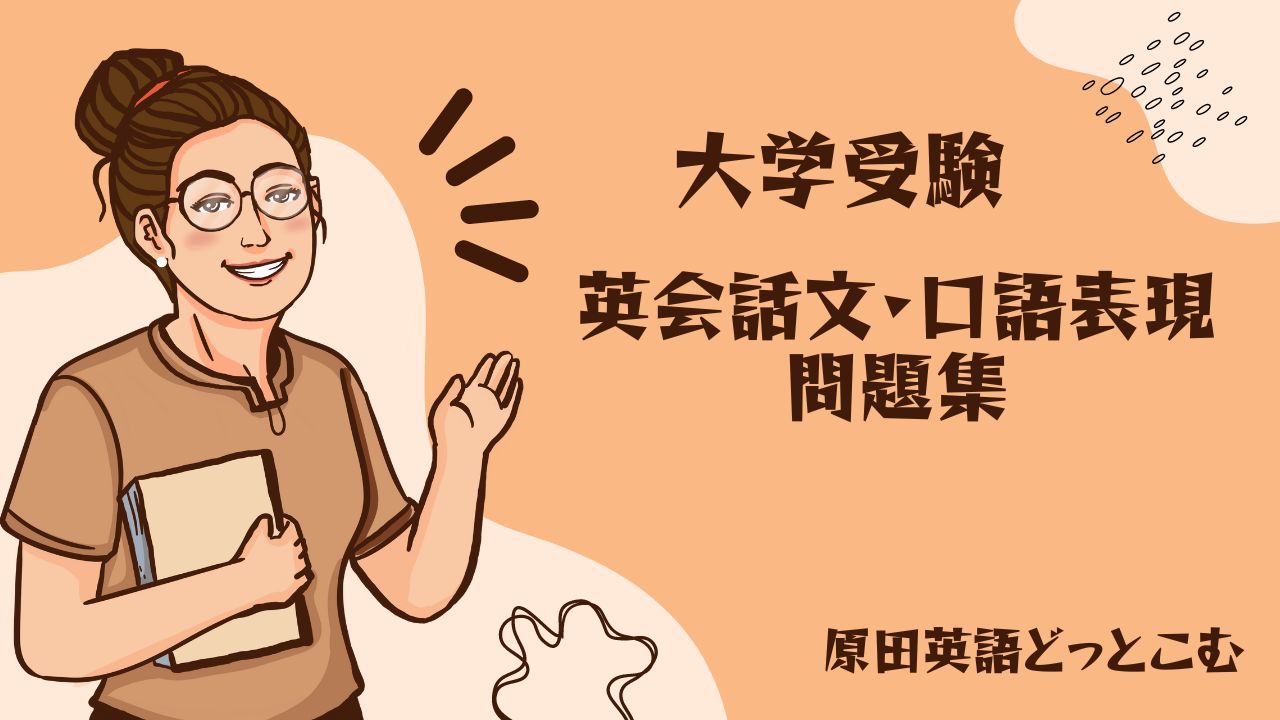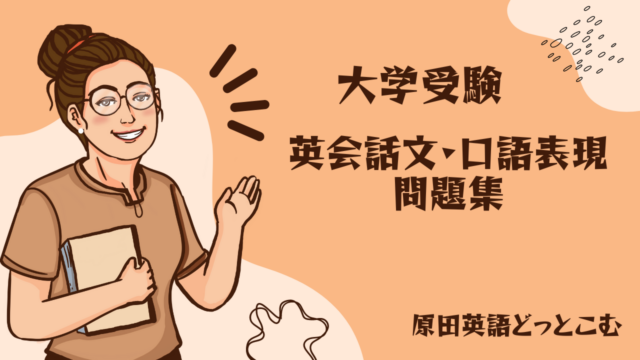128. 【明治大学(商)2024】
次の会話の(1)~(7)の空欄に入れるのに最も適切なものを(a)~(m)の中から一つずつ選びなさい。
Billy: Hi, Max. How was your English class today?
Max: It was great. We first read a news story. It was about a fisherman who swam to a small island after his boat sank in a storm. He was there alone for seven months before being rescued.
Billy: That’s incredible!
Max: Not only that, but the only things he had with him on the island – besides the clothes he was wearing, of course – were his fishing nets, coffee mugs from the boat, and toothbrush. After reading the story, our teacher then asked us to decide what three things we would like to have with us if we were stuck on an island like the fisherman.
Billy: You are allowed to have only three things with you?
Max: ( 1 ).
Billy: I don’t think I could ever select just three things. There are too many things I would like to take with me.
Max: Well, the assignment wasn’t really about deciding which things to take with you. It was more about deciding which items you would prefer to have with you if you were in the fisherman’s situation. After all, ( 2 ). As an example, you might want to have a tent on the island with you. It would protect you from the rain and the sun. You usually don’t travel with one, right?
Billy: Oh, ( 3 ). No, and I probably wouldn’t take one with me if I travelled somewhere by boat. Well, a tent certainly would be nice to have. Could one of my items be my smartphone?
Max: Sure. But according to the assignment, you are supposed to imagine that you will be stuck on the island for seven months like the fisherman was, so ( 4 ).
(1)
1. Choose it
2. Have it your way
3. Once you ask for permission
4. That’s all
(2)
1. coffee always tastes better when you drink it from your own coffee mug
2. everything will be fine with the fisherman on the island
3. no one ever plans on living on such an island for so many months like that
4. you let such a terrible thing happen to you on your first boat trip
(3)
1. I see what you mean
2. it’s not up to you
3. that must be the one
4. there is no use thinking about it
(4)
1. be sure to check with the fisherman first
2. the other people on the island should also be able to use it
3. there is no way you can stay on the island any longer
4. you cannot use it to call for help
解答:
(1) 4. That’s all
(2) 3. no one ever plans on living on such an island for so many months like that
(3) 1. I see what you mean
(4) 4. you cannot use it to call for help
解説:
(1) 選択肢4が正解です。”That’s all”は「それだけ」という意味で、先生から与えられた条件が3つの物だけであることを意味しています。
(2) 選択肢3が正解です。誰も何ヶ月もそのような島に住むことを計画していないということを表しています。
(3) 選択肢1が正解です。”I see what you mean”は「あなたの言わんとしていることがわかります」という意味で、Maxの説明に対するBillyの理解を示しています。
(4) 選択肢4が正解です。7ヶ月間島に取り残された状況を想像するように言われているので、スマートフォンで助けを呼ぶことはできないということを意味しています。
日本語訳:
ビリー: こんにちは、マックス。今日の英語の授業はどうだった?
マックス: 素晴らしかったよ。まず、ニュースを読んだんだ。嵐で船が沈んだ後、漁師が小さな島まで泳いだという内容だったんだ。救助されるまでの7ヶ月間、彼は一人でそこにいたんだ。
ビリー: それは信じられないね!
マックス: それだけではないんだ。島にいる間、彼が持っていたのは – もちろん着ていた服以外には – 漁網とボートのコーヒーマグ、それに歯ブラシだけだったんだ。その話を読んだ後、先生は、もし漁師のように島に取り残されたら、一緒に持っていきたい3つのものを決めるように言ったんだ。
ビリー: 3つだけ持っていくことができるのかい?
マックス: それだけだよ。
ビリー: 私には3つのものだけを選ぶことなんてできないと思うよ。一緒に持っていきたいものがたくさんあるからね。
マックス: ええと、この課題は、一緒に持っていくものを決めることが本当の目的ではないんだ。むしろ、もし漁師のような状況に置かれたら、どのアイテムを持っていたいと思うかを決めることが目的なんだ。結局のところ、誰も何ヶ月もそのような島に住むことを計画していないからね。例えば、島にテントがあると良いと思うかもしれない。雨や日差しから身を守ってくれるからね。普段はテントを持ち歩かないよね?
ビリー: ああ、言っていることはわかるよ。いや、ボートで旅行するときにテントを持っていくこともないだろうね。でも、テントがあるのは確かにいいね。私の持ち物の1つをスマートフォンにしてもいい?
マックス: もちろん。でも、課題では、漁師のように7ヶ月間島に取り残されることを想像するように言われているから、助けを呼ぶためにスマートフォンを使うことはできないよ。
重要な表現:
【be stuck on】
「〜に立ち往生する」または「〜から抜け出せない」
⇒ このフレーズは、ある場所や状況から出られない、または動けないことを表現するのに使われます。物理的に動けない場合や、困難な状況から脱却できない場合などに用いられます。
<例文>
“Due to heavy snowfall, many cars were stuck on the highway for hours.”(大雪のため、多くの車が何時間も高速道路に立ち往生した。)
【call for help】
「助けを求める」または「救助を要請する」
⇒ このフレーズは、緊急事態や困難な状況において、外部の支援や救助を求めることを表現するのに使われます。
<例文>
“When the hiker got lost in the mountains, he used his satellite phone to call for help.”(ハイカーが山で迷ったとき、彼は衛星電話を使って救助を要請した。)



